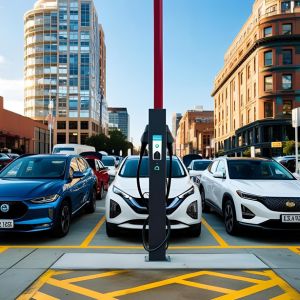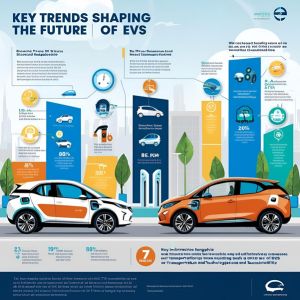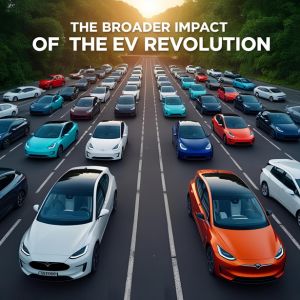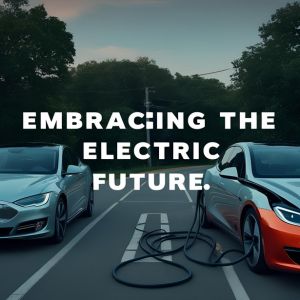The automotive landscape is undergoing a monumental transformation, and at the forefront of this revolution are electric vehicles (EVs). No longer a niche market, EVs are rapidly gaining mainstream appeal, promising a cleaner, more sustainable, and potentially more cost-effective mode of transportation. Understanding the trajectory of this technology is crucial for anyone considering a new vehicle purchase, interested in environmental sustainability, or simply curious about the future of mobility.
This article will delve into what you need to know about the future of electric vehicles, exploring current trends, upcoming innovations, and the potential impact on our lives and the planet.
The Current State of the EV Market:
 The adoption of EVs has seen significant growth in recent years. Several factors are driving this trend:
The adoption of EVs has seen significant growth in recent years. Several factors are driving this trend:
- Environmental Concerns: Growing awareness of climate change and air pollution has fueled the desire for cleaner transportation alternatives. EVs produce zero tailpipe emissions, contributing to improved air quality and a reduction in greenhouse gas emissions.
- Government Incentives: Many governments worldwide are offering tax credits, rebates, and other incentives to encourage the purchase and adoption of EVs.
- Technological Advancements: Battery technology has improved significantly, leading to longer driving ranges, faster charging times, and more affordable battery costs.
- Growing Model Availability: Automakers are increasingly investing in EV development, resulting in a wider variety of models available, from compact cars to SUVs and even trucks.
- Lower Running Costs: Electricity is generally cheaper than gasoline, leading to lower fuel costs for EV owners. EVs also have fewer moving parts, resulting in lower maintenance costs.
Key Trends Shaping the Future of EVs:

Several key trends are poised to accelerate the adoption and evolution of electric vehicles:
- Improved Battery Technology: Expect continued advancements in battery energy density, leading to even longer driving ranges on a single charge. Solid-state batteries, which offer the potential for faster charging, increased safety, and higher energy density, are a promising area of development.
- Faster and More Accessible Charging Infrastructure: The expansion of public charging networks is crucial for widespread EV adoption. Expect to see more fast-charging stations along highways and in urban areas, making long-distance travel in EVs more convenient. Wireless charging technology is also being explored.
- Vehicle-to-Grid (V2G) Integration: V2G technology allows EVs to not only draw power from the grid but also to feed energy back into it. This can help stabilize the power grid and potentially provide financial benefits to EV owners.
- Integration with Smart Cities: EVs will become increasingly integrated with smart city infrastructure, potentially communicating with traffic management systems to optimize routes and reduce congestion.
- Autonomous Driving Capabilities: Many EVs are already equipped with advanced driver-assistance systems (ADAS), and the trend towards fully autonomous electric vehicles is expected to accelerate.
- Sustainable Manufacturing and Recycling: The environmental impact of EV production, including battery manufacturing, is a growing concern. Expect greater focus on sustainable sourcing of materials, more efficient manufacturing processes, and improved battery recycling programs.
What You Need to Know as a Consumer:

If you’re considering purchasing an EV, here are some key factors to keep in mind:
- Range: Consider your typical driving needs and choose an EV with a range that comfortably meets your daily and occasional travel requirements.
- Charging Options: Evaluate your home charging capabilities and the availability of public charging stations in your area.
- Battery Life and Warranty: Understand the battery warranty and expected lifespan, as the battery is a significant component of an EV.
- Cost and Incentives: Research the purchase price of different EV models and any available government incentives or tax credits.
- Maintenance: While EVs generally require less maintenance than gasoline-powered cars, understand the specific maintenance requirements for the model you are considering.
- Charging Speed: Consider the charging speed of the vehicle, especially if you plan to rely heavily on public charging.
The Broader Impact of the EV Revolution:

The widespread adoption of EVs will have far-reaching consequences:
- Environmental Benefits: Significant reductions in air pollution and greenhouse gas emissions will contribute to a healthier planet.
- Energy Independence: Reduced reliance on fossil fuels can enhance energy independence and reduce geopolitical risks associated with oil production.
- Economic Opportunities: The EV industry is creating new jobs in manufacturing, battery production, charging infrastructure development, and related services.
- Changes in the Automotive Industry: Traditional automakers are rapidly transitioning towards electric vehicle production, and new EV-focused companies are emerging.
- Urban Planning and Infrastructure: The growth of EVs will necessitate changes in urban planning to accommodate charging infrastructure and potentially reduce the need for traditional gas stations.
Challenges and Considerations:
While the future of EVs is promising, there are still challenges to address:
- Charging Infrastructure Availability: Expanding the charging network to meet the needs of a growing EV fleet is crucial.
- Battery Production and Supply Chain: Ensuring a sustainable and ethical supply chain for battery materials is essential.
- Battery Recycling: Developing efficient and environmentally sound battery recycling processes is vital to minimize waste.
- Initial Purchase Price: While the total cost of ownership of an EV can be lower, the initial purchase price can still be higher than comparable gasoline-powered vehicles.
- Range Anxiety: Concerns about the limited driving range and availability of charging stations can still deter some potential buyers.
Conclusion: Embracing the Electric Future

The future of electric vehicles is bright, with continuous advancements in technology, increasing consumer interest, and growing government s
upport. EVs are poised to play a pivotal role in shaping a more sustainable and efficient transportation system.
Understanding the trends, benefits, and considerations surrounding electric vehicles is essential for making informed decisions about your future transportation needs. As the technology matures and the infrastructure expands, EVs will become an increasingly compelling and accessible option for a wider range of consumers. The electric revolution is here, and it’s set to transform the way we move for generations to come.
This Article was generated by AI.


